Design for Discovery—Framework for Design Excellence
Every design project presents a unique opportunity to apply lessons learned from previous projects and discover new information to refine the design and construction process.
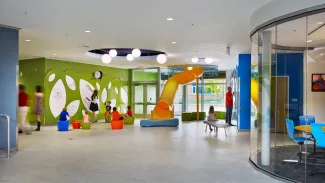
Framework for Design Excellence: Design for Discovery
- How can the design process foster a long-term relationship between designers, users, and operators to ensure design intentions are realized and building performance can improve over time?
- How are performance data and experiential stories shared, even if the findings fall short of the vision?
- How are lessons learned through construction administration shared to project teams?
- What strategies promote a sense of discovery and delight?
Focus topics
- Leveraging learning for future projects
- Knowledge sharing & lessons learned
- Occupant engagement
- Post-occupancy evaluations
- Design that influences behavior
Design for Discovery toolkit
If you can do only one (or a few) thing(s):
- ZERO CARBON: Conduct post-occupancy assessments to evaluate the achievement of the project's carbon goals. Advocate for carbon reduction in projects to community stakeholders, local government, and authorities having jurisdiction.
- RESILIENT: Conduct post-occupancy assessments to evaluate the achievement of the project's resilience goals. Study the building performance under less-than-ideal conditions, such as disaster events. Does it provide passive survivability, continuity of operations, or serve as a community resource? Monitor and suggest improvements to adaptation plans prior to and after disaster events.
- EQUITABLE: Conduct post-occupancy assessments to evaluate the achievement of the project's equity goals.
- HEALTHY: Conduct post-occupancy assessments to evaluate the achievement of the project's human health and well-being goals. Leverage what you learn to inform future projects
Design for Discovery is about what the designer can learn from the design process and the finished product. Every completed building contains a textbook’s worth of lessons, successes, mistakes, strokes of genius, and strategies for improvement, but this wealth of information will not come knocking on the office door.
Assess the other nine measures and review the strategies employed to reach the finished product. During the design process, track the goals. At the end of the construction process, take the time to record lessons learned, successes, and any strategies or materials that warrant future follow-up to gather feedback. Engage the consultants and project team members in a project close-out review to capture any cross-discipline feedback about the completed building. Stay engaged with each building over the long term to extract its performance and share this with the rest of the profession. Any opportunity to re-engage with your client is good for business.
Knowledge sharing & lessons learned
With every project, teams collect valuable experiences that shape their future design efforts and what they can implement on new projects. Leveraging what you learn can inform innovative solutions and opportunities to engage with others.
Design teams can improve outcomes by learning from previous project discoveries. During the project process maintain a list of lessons learned, opportunities, and challenges, and identify where you may want to seek feedback from contractors, end users, or other team members. Review how strategies were implemented, identify mistakes, identify the solutions to correct them, and document the most productive strategies for the future. Share this information with project team members, with office staff, or to a wider audience through industry platforms so that our profession can adapt to current market challenges and collectively increase the value that architects bring to the process.
Actions:
- Engage the project team members for a project close-out review.
- Record lessons learned—details and materials to be repeated or not repeated.
- Share the outcomes with your staff.
- Create an in-house resource platform or process for documenting and sharing lessons. Use the lessons from one project to improve subsequent projects.
- Share the outcomes of your design decisions with the world. It's especially important for the industry to learn from undesirable outcomes rather than quietly ignore them. Use platforms such as conference presentations, white papers, and journal articles to document and share design decisions and their outcomes.
- Study how the building and occupants fare during and after a disaster event. Suggest improvements that could reduce hazard risks in the future.
- Monitor the adaptation plan and be aware of triggers for upgrades to the project. For example: increased flooding at the site may inspire the construction of floodwalls or flood gates; increased temperatures may recommend exterior sun shading or landscaping.
- Monitor energy use and watch for big changes in usage that might indicate problems. Identify mechanical or behavioral modifications to improve performance. Report to the 2030 Commitment and maintain your own performance stats for each project.
- Document each post-occupancy exercise as a story, from the initial design decision to the outcome to the solution and to new thoughts moving forward. The process is not always a straight line. Including the trials and tribulations, double-backs, and alternative approaches makes for a richer story.
- Display narratives on the history of the site, historical inequities, and how the building has addressed (or tried to address) equity.
Occupant engagement
Buildings are for people. Buildings require ongoing maintenance and operational adjustments. During design, solicit feedback from building operators, maintenance personnel, and management staff to ensure the building is easy to use and make adjustments when necessary.
Actions:
- During predesign, develop the owner’s project requirements (OPR) for the project, including specific design parameters from the owner’s previous or current buildings that will inform this project.
- Conduct tours or evaluations of existing facilities to help guide project goals, promote favorable design strategies, and overcome challenges.
- Design building HVAC, lighting, and control systems to align with the expertise and resources of the maintenance staff.
- Specify that the commissioning agent or contractor shall provide a building user/systems manual for all building systems. Specify that the owner and facility managers shall be trained on all building systems before fully operating the building.
Post-occupancy evaluations
The rigor of post-occupancy evaluations varies. Before seeking post-occupancy feedback from the owner/occupants, determine what items were critical during the design and construction process that should be reviewed now that the building is operational. Conversations with building operators after occupancy will demonstrate that you care about the building and help the design team understand building performance: resource consumption, programming functions, occupant satisfaction, and durability of the materials and details.
Actions:
- Review the OPR and the recorded goals for the project. Hold conversations with users about the comfort and controllability of the spaces they occupy.
- Provide training for innovative systems to help occupants become comfortable making adjustments or monitoring data from sensors.
- Visit the project multiple times, if possible. Seek feedback from the owner, occupants, and building operator on operational issues, maintenance tasks, and the durability of materials.
- Survey, interview, or observe occupants to assess if they are utilizing spaces as intended. Have they made modifications? How does this impact future designs? Survey, interview, and observe occupants to assess satisfaction with thermal comfort, lighting, air quality, acoustics, daylighting, views, glare, and ergonomics. If there are areas/topics where occupants are dissatisfied, assist the owner with a plan to investigate.
- One of the best ways to stay engaged with a completed project is to ask for utility bills. With 12 months of energy and water use data, the project teams will be able to compare a building’s resource consumption against both benchmarks and predicted values. Inconsistencies can then be explored more deeply and strategies for improvement can be developed.
- Discover if the building operated as intended after an extreme event. Were emergency procedures easy to follow and effective in reducing damage? What could have been done differently?
Design that influences behavior
The sense of delight can be defined as the occupants’ feeling of harmony with the spaces and/or places they occupy.
Actions:
- During design, discuss and establish plans for materials management (waste, recycling, etc.) throughout the building so that space can be allocated, and signage installed to inform the occupants.
- Design building features that empower and encourage the occupants to engage with how a system works, understand how to adjust it, and recognize the consequences of their actions.
- Design building features that allow occupants to use the stairs, engage with nature, and develop a sense of place that allows them to feel ownership of their space.
- Celebrate inventive solutions to climate action, inclusive design, and equitable relationships with high-visibility design features. Provide signage or interactive elements that teach the occupants and neighbors about the building and its systems.
- Invite the community to share the building’s public spaces, learn about innovative building systems, and recognize the value of healthy, resilient, equitable, and zero carbon design.
- Does the building tell a story that is of interest to a broader audience? How can the lessons learned instruct other communities, practitioners, or clients?
- The AIA 2030 Commitment By the Numbers: Post-Occupancy Evaluation (POE): POEs allow architects to access performance data and assess and address any problems. When POE reveals that a project is consuming more energy than expected, these lessons learned can be invaluable for future projects.
- Resources Center for Building Performance and Diagnostics: Carnegie Mellon University conducts research, demonstrations, and teaching to advance the sustainability and performance of buildings and communities.
- UC Berkeley Center for the Built Environment is where prominent industry leaders and internationally recognized researchers cooperate to produce substantial, holistic, and far-sighted research on buildings.
- University of Washington’s Integrated Design Lab utilizes evidence-based design practices to evaluate high performance and healthy building research to improve the quality of the built environment.
- Whole Building Design Guide on POEs reinforces that every lesson learned about the built environment bends the curve towards higher performing buildings.
Design excellence case studies
Explore four COTE® Top Ten award recipients demonstrating informed design discovery.
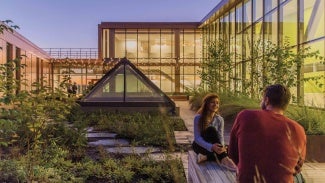
John W. Olver Design Building
Amherst, Massachusetts | Leers Weinzapfel Associates
Knowledge sharing & lessons learned: The John W. Oliver Building is the largest mass timber academic building in the U.S. The post-occupancy evaluation focused on the metering and verification of the building's energy use. The process revealed that the building was consuming more energy—both steam and chilled water—than originally anticipated in the design energy model. Initial findings from the post-occupancy metering and verification were presented at the Boston Society of Architects COTE Round Table to share performance challenges with the broader design community.
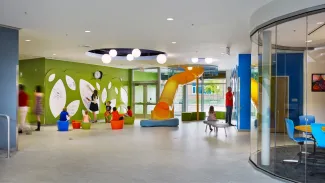
Discovery Elementary School
Arlington, Virginia | VMDO Architects
Discover that influences behavior: Discovery Elementary School is the largest zero-energy school in the U.S. Using a common statistical framework, three different surveys were created, focused on the concerns of instructional staff, facilities and operation personnel, and the community-based building committee.
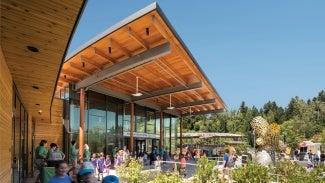
Oregon Zoo Education Center
Portland, Oregon | Opsis Architecture
Occupant engagement: A post-occupancy evaluation (POE) conducted in the winter of 2018 surveyed the building's wide range of occupants (education center, camp, teen program, food service, catering, animal care, and program staff, and partners) in an array of areas. Many core principles of the building design received positive responses. By monitoring energy use and production, several installation issues were discovered. At the Living Future unConference, the design team and Zoo Teens participants shared how flipping the dynamic of stakeholder workshops allows the youth to lead maximized creative, integrated ideas while engaging the next generation in a meaningful way.
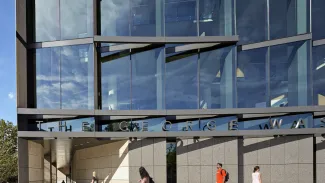
Milken Institute School of Public Health
Washington, D.C. | Payette
Post-occupancy evaluations (POEs): Approximately one year following completion, a POE was conducted to study user experience at the Milken Institute. This evaluation included interviews and an online survey, eliciting over 100 responses from faculty, administration, and students. The survey covered how the building supports public health, work and social activities, LEED awareness, and thermal comfort. The POE revealed that key design goals were highly successful, and also uncovered some unexpected results.
This publication is designed to provide accurate and authoritative information in regard to the subject matter covered. It is published and distributed with the understanding that the publisher is not engaged in rendering professional services. If professional advice or other expert assistance is required, the services of a competent professional person should be sought.
AIA does not sponsor or endorse any enterprise, whether public or private, operated for profit. Further, no AIA officer, director, committee member, or employee, or any of its component organizations in his or her official capacity, is permitted to approve, sponsor, endorse, or do anything that may be deemed or construed to be an approval, sponsorship, or endorsement of any material of construction or any method or manner of handling, using, distributing, or dealing in any material or product.
If you have any questions or feedback regarding the Framework for Design Excellence, please let us know.
Learn how the framework inspires and provides a toolkit for sustainable, resilient, and inclusive design.
Browse the glossary of key terms for the Framework for Design Excellence.
